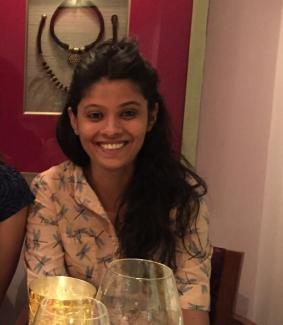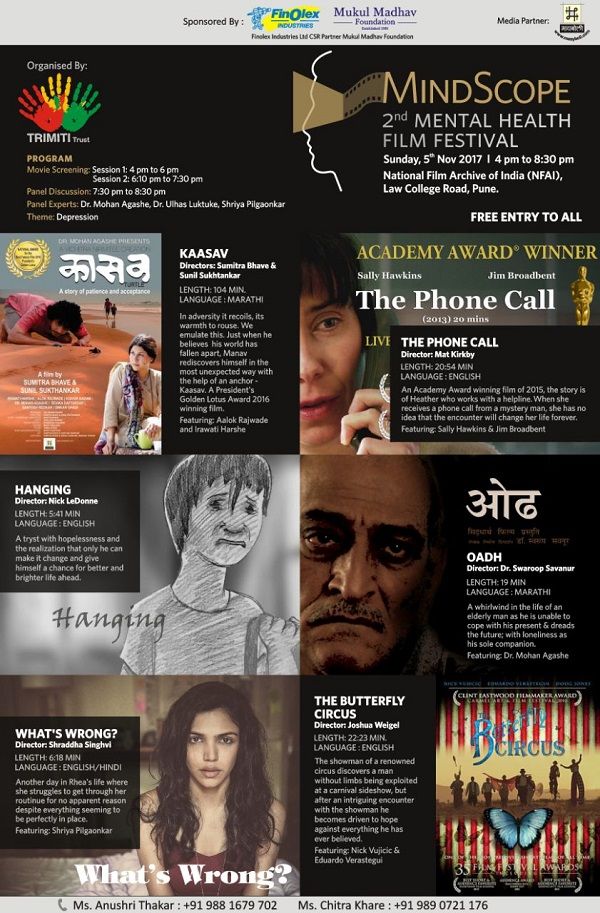
A film festival dedicated exclusively to mental health, particularly depression, is on this weekend in Pune with screenings of several award winning films. We speak to Anushri Thakar, Clinical Psychologist & Co- founder, TRIMITI Trust, who curated the Mental Health Film Festival (MHFF) to create awareness and build an inclusive society.
MindScope, a festival of films focusing on mental health, seems unique. What was the inspiration behind it?
Creating awareness on mental health is one of TRIMITI Trust’s key activities. Entertainment is a powerful medium of education with a mass appeal. Owing to this, we host the first of its kind, a ‘no fare, open to all’ Mental Health Film Fest (MHFF) since October 2015. Our choice of films is such that they are engaging and entertaining, cinematic yet authentic in their portrayal of the mental health problems.
In collaboration with P M Shah Foundation, we conducted our first MHFF at National Film Archives of India (NFAI) Pune on Wednesday October 7, 2015. In September 2016, TRIMITI Trust collaborated with Sangath, Goa, a leading NGO working for mental health & Psychiatric Society of Goa (GPS) for the Second edition of MHFF. Going beyond the set realms and reaching out to newer audience, seems befitting for the cause of spreading awareness. Both the fests had packed cinema hall and audience interaction. The audience actively participate in the discussion centred around the theme of the fest and on the stigma, treatment and burden associated with mental illnesses.
Which films are shortlisted for the festival? Could you tell us briefly about them?
This year W.H.O. marked the World Health Day (07 April ) with the theme Depression: Let’s talk while the World Mental Health Day (Oct 10) theme was Mental health at work place. Our festival theme this year is Depression and acknowledges the theme for Mental Health Day as well. We have 6 films: Five of which are short, while Kaasav is full-length feature film. It received the 2016 President’s Golden Lotus Award.
- The Phone Call – A wrenching story of loss and depression.
- Hanging – A boy’s tryst with hopelessness.
- What’s wrong? – A girl who struggles to get through her daily routine.
- Oadh – The life of an elderly man as he deals with loneliness.
- The Butterfly Circus – A paraplegic’s drive to hope.
- Kaasav – A young man’s discovery of himself.

All of them are stories, that have a connect. The choice of films was based on the premise that we need to narrate stories because it’s easy to connect, associate with them, yet not lose the educational value.
Do you think the Marathi film on depression and suicide, Kaasav, which won the National award for Best film, will pave the way for similar productions?
Kaasav is thematically very strong a film, speaks of not just about depression but also about the fabric of life and living and how it’s changing. We certainly need more such films that speak of change critical issues pertaining to mental health and beyond without being preachy.
What is the target audience for the festival?
The endeavour is developing awareness through entertainment. We wish to create awareness about mental health issues in the society at large to be able to provide a fair chance of inclusion to those having mental health issues.
With MindScope Mental Health Film Festival, we intend to reach out to the general masses. It is not targeted to the specific audience of patients, caregivers and practitioners. That would rather defeat the purpose. We expect people of varied backgrounds to attend the fest.
What will be the other sidelights that the audience can look forward to at MindScope?
With this we want to do our bit of lifting the taboo off discussing about mental wellbeing. We intend to provide a platform to discuss about the ways out. We want to let people know that there is always a chance to restore health, it is all about seeking help as and when required. Like we do for any physical ailment, we should seek assistance for mental ailments too, not deny or brush them off under the carpet.
Do you think MindScope could also help lift stigma surrounding depression and anxiety?
That’s the purpose. And our previous two experiences say we have been successful, if not entirely partially so. It’s still a battle won, and we have a long way to go.
Depression is one of the most common mental disorders in modern times. As a psychologist, what tips and strategies would you recommend to prevent depression?
One in twenty Indians suffer from depression. Some easy ways to stay in good mental health are:
- build and seek support from family and friends,
- getting sufficient sleep,
- eating well to keep the nutritional balance,
- regular exercise,
- engaging in activities which one enjoys,
- avoid self-medication, alcohol and tobacco.
In India, although depression is on the rise, the support system is still very poor. How do you think we can improve the situation?
Synchornizing the medical, judicial and social systems could help. The government and non governmental organizations(NGOs) working in tandem with each other would be an ideal situation to cater to the mental health needs.
Since the last three years, your organization, Trimiti Trust, has been working towards awareness generation, rehabilitation and identifying job opportunities for those with mental health problems. How successful have your endeavours been?
Our primary focus is on promotion and restoration of mental health through holistic reintegration. We try to provide effective, evidence based, culturally relevant interventions for people with mental illnesses. TRIMITI has commissioned program to place people with psychiatric diagnosis into jobs matching with their skills, interests and qualifications (in that order). I can happily say, that we have assisted people who have come to us in reinstating their dignity with this approach, with only a few exceptions.






